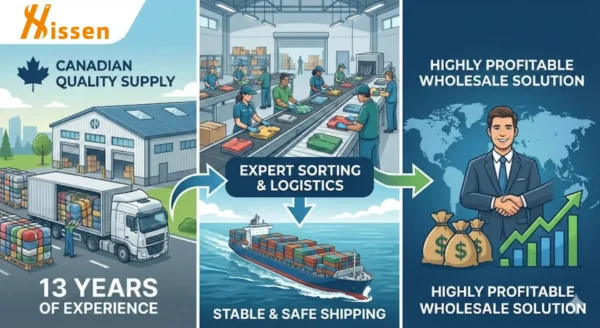I. Introduction: Why Finding a Reliable Supplier Matters
In the global wholesale clothing industry, every distributor, reseller, and trading company understands that the foundation of their business success lies in the strength of their supply chain. For B2B buyers, sourcing from a trustworthy branded clothing bales supplier is not simply a matter of acquiring stock—it is about protecting margins, ensuring consistent quality, and maintaining a reputation with end buyers.
The resale of branded clothing bales has grown into a significant segment for wholesale and retail operators across different markets. Yet, behind this opportunity lies a challenge: the quality of suppliers varies greatly. While some suppliers focus on transparent processes, careful sorting, and professional packaging, others may prioritize quick turnover without considering the long-term impact on their business partners.
For a B2B buyer, choosing the wrong branded clothing bales supplier can lead to inconsistent shipments, unreliable product mixes, and even disputes over delivery terms. On the other hand, building a relationship with a reliable supplier means gaining access to steady inventory flow, predictable quality standards, and stronger negotiating positions.
In wholesale clothing, trust is not built overnight. It comes from careful research, transparent communication, and structured evaluation. This article will guide B2B buyers on how to identify dependable suppliers, evaluate their reliability, and take practical steps to create long-term business partnerships.
By the end of this guide, you will understand what branded clothing bales mean, how to find suppliers through professional channels, and how to assess their business credibility before making large-scale purchasing decisions.
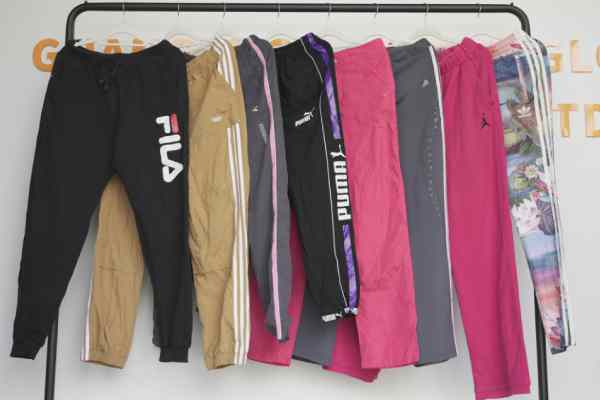
II. What Are Branded Clothing Bales?
Before diving into sourcing strategies, it is essential to clarify what branded clothing bales represent in the wholesale supply chain. In the context of bulk apparel distribution, a “bale” refers to a compressed package of clothing, often wrapped and secured for efficient transport. These bales typically contain branded items—garments originally produced for mainstream consumer markets—that are aggregated, sorted, and prepared for resale in bulk.
For B2B buyers, branded clothing bales present an attractive business model for several reasons:
Bulk Efficiency: Instead of sourcing items one by one, buyers receive wholesale lots in bulk packaging, reducing handling costs and simplifying logistics.
Resale Flexibility: Branded clothing bales can be redistributed to various retail channels, from independent shops to online platforms, depending on the buyer’s business model.
Market Appeal: The inclusion of branded items often increases perceived value for end consumers, giving resellers an advantage when positioning their offerings.
It is important to note that bales differ from standard wholesale apparel in terms of packaging, sourcing origins, and resale strategies. Whereas conventional wholesale apparel may be distributed as individual SKUs, bales often come as pre-packed lots. For a B2B buyer, this means balancing predictability with opportunity: while the content of a bale may vary, the cost efficiency and resale margin can be compelling.
When considering a branded clothing bales supplier, buyers must understand that not all suppliers operate with the same level of professionalism. Some suppliers specialize in carefully sorted bales, while others focus on volume without strict quality control. Understanding this distinction is the first step toward making informed sourcing decisions. For buyers who want to enter this market with confidence, a detailed guide to buying Branded second-hand clothes wholesale can serve as a practical reference.

III. How to Find Reliable Suppliers (Focus on Independent Sellers and Direct Sources)
Finding a trustworthy branded clothing bales supplier requires more than a quick online search. For B2B buyers, the sourcing journey should be strategic, with a clear understanding of supply chain options. Here are the primary pathways:
Independent Supplier Websites
Independent supplier websites often serve as the most direct way for B2B buyers to access branded clothing bales. Unlike generic online marketplaces, independent websites are usually operated by companies that specialize in wholesale distribution. These suppliers often provide detailed information about their packaging standards, logistics processes, and order terms.
For B2B buyers, sourcing through independent websites allows direct negotiation with suppliers, reducing intermediary costs and creating opportunities for long-term partnerships. It also enables buyers to evaluate how professional and transparent a supplier appears through their online presence. A well-maintained website, clear product descriptions, and consistent communication channels are all positive indicators of a reliable branded clothing bales supplier.
Industry Trade Platforms
While large-scale B2C marketplaces are often saturated, B2B-focused trade platforms remain an effective way to identify potential suppliers. These platforms allow wholesale buyers to compare suppliers side by side, review business credentials, and initiate contact for bulk orders. Many of these platforms also provide verification services, adding an additional layer of security for buyers.
Referrals and Network Recommendations
In B2B wholesale, word of mouth remains a powerful tool. Many distributors and importers rely on referrals from their business network when sourcing a new branded clothing bales supplier. Asking existing contacts, industry peers, or even logistics partners can lead to reliable supplier recommendations. A referral from a trusted partner often carries more weight than a supplier’s own marketing claims.
Trade Fairs and Industry Events
For buyers who prefer face-to-face negotiations, trade fairs provide opportunities to meet suppliers directly. Events dedicated to wholesale apparel or secondhand markets allow buyers to assess product samples, ask detailed questions, and establish initial trust. Meeting suppliers in person can reveal professionalism and transparency that may not be evident online.
Local Import and Distribution Hubs
In many regions, established import hubs serve as centers where branded clothing bales are distributed to local markets. For B2B buyers, visiting these hubs offers a way to directly inspect inventory and verify supplier practices. This approach requires more effort but provides tangible insights into a supplier’s operations.
Regardless of the sourcing channel, B2B buyers must approach the search strategically. The first supplier you encounter may not be the most reliable. Instead, compare multiple options, engage in conversations, and evaluate responses before committing to long-term supply agreements.
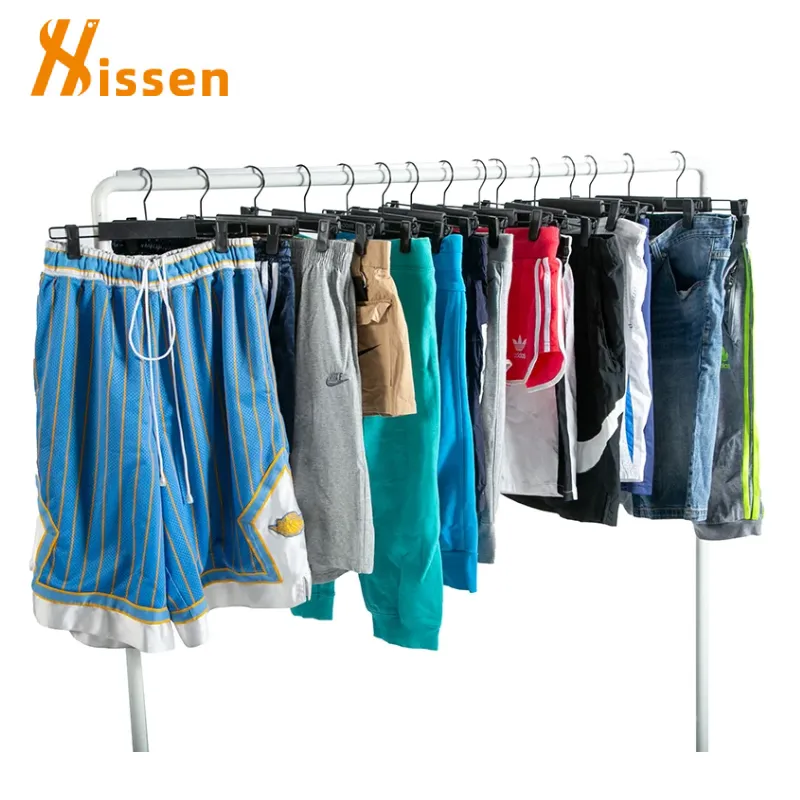
IV. How to Evaluate Supplier Reliability
Once potential suppliers have been identified, the next challenge is distinguishing between those who promise reliability and those who deliver it consistently. For a B2B buyer, evaluating the trustworthiness of a branded clothing bales supplier should involve a multi-step process:
Business Transparency
Reliable suppliers are transparent about their operations. This includes providing clear information about sourcing practices, packaging methods, shipping policies, and payment terms. If a supplier avoids answering basic questions or provides vague responses, it is a sign that they may not be dependable for long-term cooperation.
Communication and Responsiveness
A supplier’s willingness to engage professionally is a strong indicator of reliability. For B2B buyers, response time to inquiries, clarity of communication, and willingness to provide references are critical signals. A reliable branded clothing bales supplier values business relationships and invests in clear, timely communication.
Professional Online Presence
In today’s B2B landscape, a supplier’s digital footprint speaks volumes. A professional website, updated contact channels, and consistent branding all indicate a serious business. Conversely, poorly maintained online platforms or lack of verified information may raise red flags.
Logistics and Delivery Track Record
For wholesale buyers, timely delivery is crucial. A supplier who consistently ships orders on time and follows agreed-upon terms demonstrates operational reliability. Asking potential suppliers about their logistics partners, estimated delivery times, and order handling processes can help verify their credibility.
References and Business Reviews
While not always available, reviews or references from other B2B buyers can provide valuable insight. A reliable supplier should be able to provide references upon request, particularly if they aim to establish long-term cooperation.
Sample Orders and Trial Transactions
Before committing to large orders, many B2B buyers choose to place a smaller test order. This allows them to evaluate the actual quality of branded clothing bales, the supplier’s packaging methods, and the efficiency of their logistics. Suppliers who are confident in their process are usually open to smaller initial transactions as a trust-building step.
Contractual Clarity
Another hallmark of a trustworthy supplier is their willingness to engage in clear contractual agreements. A professional branded clothing bales supplier will outline terms in writing, covering aspects such as delivery schedules, payment structures, and dispute resolution procedures. Ambiguity in contracts often leads to future complications.
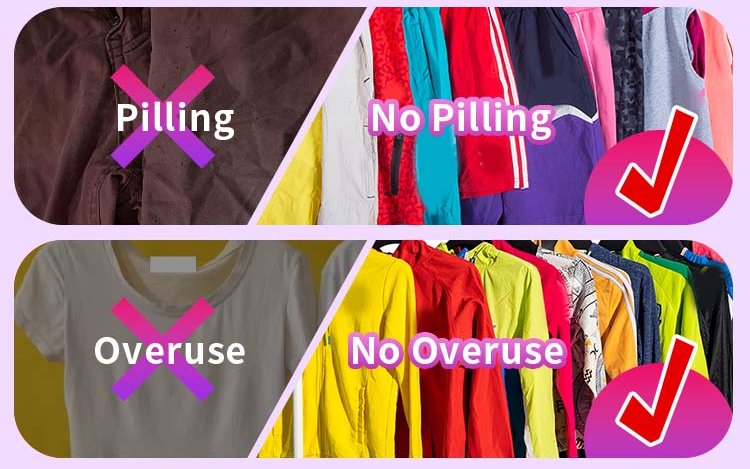
V. How to Build Long-Term Cooperation with a Supplier
For B2B buyers, the value of finding a reliable branded clothing bales supplier goes beyond the first successful order. The real competitive advantage comes from establishing a long-term business relationship that ensures stability, trust, and mutual growth. In wholesale markets, long-term cooperation can significantly reduce operational risks, optimize costs, and provide predictable inventory flow. But building such cooperation requires strategic effort from both sides.
Clear Communication from the Start
One of the first steps in creating long-term cooperation is setting the right tone in communication. When buyers clearly express their expectations about quality, packaging, timelines, and order frequency, suppliers are better positioned to deliver consistently. At the same time, a trustworthy supplier will outline what they can and cannot provide. This transparency avoids misunderstandings and builds trust from the very beginning.
Consistency in Orders and Commitments
Suppliers value buyers who place regular and consistent orders. For a branded clothing bales supplier, predictable order volumes allow better planning in sourcing, logistics, and inventory management. In return, buyers who demonstrate reliability often gain access to preferential terms, such as priority in shipments or flexible payment arrangements. Consistency strengthens the relationship and signals to the supplier that the buyer is a dependable long-term partner.
Negotiating Beyond Price
While price negotiations are important in wholesale, building a long-term partnership involves more than discussing numbers. Experienced B2B buyers understand that suppliers are more willing to invest in supportive services—such as improved packaging, faster shipping, or customized bale sorting—when they see the relationship as long-term rather than transactional. Viewing negotiations as an opportunity to align interests rather than squeeze margins leads to stronger partnerships.
Mutual Trust and Respect
Trust in B2B supply chains is a two-way street. Buyers expect suppliers to deliver on their promises, but suppliers also expect professionalism from buyers. This includes honoring payment terms, providing feedback in a constructive way, and avoiding unnecessary last-minute changes. Over time, suppliers develop preferences for working with buyers who respect agreements and approach the partnership with fairness.
Problem-Solving Approach
Challenges will inevitably arise in wholesale trade—delays, logistics issues, or unexpected variations in bales. Long-term cooperation depends on how both parties handle these challenges. A buyer who approaches problems with a solution-oriented mindset rather than a confrontational one demonstrates maturity. Likewise, a reliable branded clothing bales supplier will show flexibility and propose practical solutions. This collaborative problem-solving builds resilience into the partnership.
Periodic Reviews and Feedback
Relationships thrive on feedback. Buyers should provide regular input about shipment quality, packaging, and market reception. Constructive feedback helps suppliers refine their processes and ensures that both sides are aligned. Periodic reviews also allow both parties to identify opportunities for improvement, whether in logistics optimization or product assortment.
Long-Term Agreements
In some cases, formalizing the partnership through long-term contracts is beneficial. Such agreements can outline shipment schedules, payment frameworks, and exclusivity terms. For B2B buyers, this ensures consistent access to supply. For suppliers, it provides security of demand. Long-term agreements are often a milestone in supplier-buyer relationships, demonstrating commitment and mutual trust.
By focusing on communication, consistency, respect, and collaboration, B2B buyers can transform a supplier relationship into a strategic partnership that generates sustainable business growth.
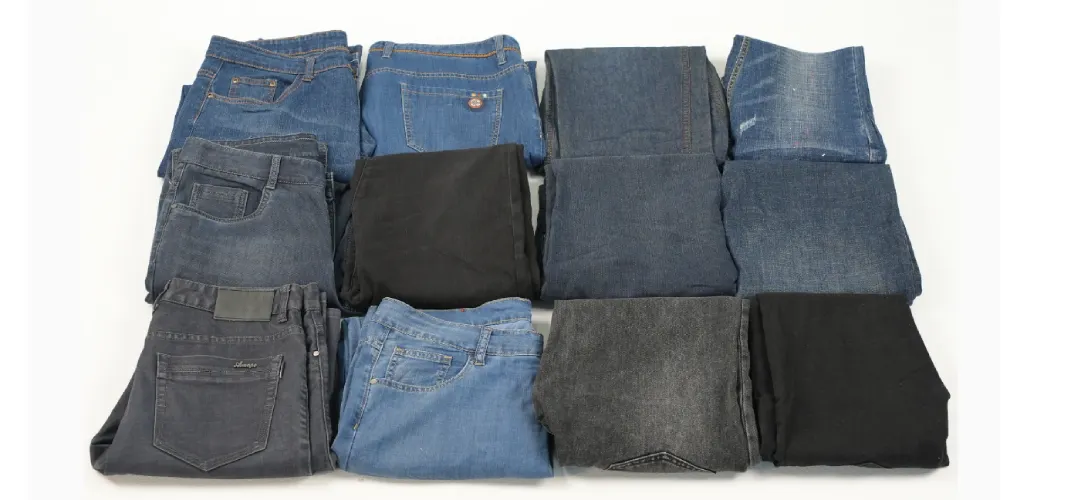
VI. Key Considerations When Selecting a Supplier
When evaluating suppliers, B2B buyers often compare multiple options across categories such as Wholesale Used Branded Clothes, bulk apparel assortments, and logistics services. Choosing the right branded clothing bales supplier is not a decision to be rushed. While building long-term cooperation is important, the initial selection process plays an equally crucial role in determining future success. Here are the most important considerations B2B buyers should keep in mind when evaluating and selecting a supplier:
Alignment with Business Needs
Not every supplier is suited for every buyer. Some suppliers specialize in certain bale assortments, others focus on regional distribution, while others may have strengths in logistics efficiency. B2B buyers should evaluate whether the supplier’s offerings align with their resale model—whether it is retail distribution, wholesale redistribution, or online sales.
Scalability of Supply
For growing businesses, the ability of a supplier to scale with demand is critical. A small branded clothing bales supplier may perform well initially, but if they lack capacity to handle larger orders in the future, buyers may face bottlenecks. Assessing scalability early prevents challenges as the business expands.
Payment and Transaction Security
Financial reliability is a cornerstone of B2B partnerships. Buyers should carefully review a supplier’s payment terms, accepted methods, and contractual clarity. Secure and transparent payment structures reduce risk for both sides. Avoiding vague arrangements ensures that both buyer and supplier are protected against potential disputes.
Shipping and Logistics Support
Efficient logistics are essential for international B2B trade. A professional branded clothing bales supplier should demonstrate established partnerships with logistics companies, clear timelines, and predictable delivery schedules. Buyers should ask about delivery methods, tracking systems, and contingency plans for delays.
Flexibility and Customization
The wholesale apparel market is dynamic, and buyers may have specific requirements for certain orders. A supplier who can accommodate requests such as bale assortment adjustments, packaging preferences, or shipping modifications demonstrates flexibility. This adaptability is often a key factor in long-term supplier selection.
Supplier’s Market Reputation
While not always easy to measure, reputation within the industry provides valuable signals. Buyers should consider feedback from peers, testimonials, or any history of disputes. A supplier with a consistent reputation for reliability is far more likely to be a suitable long-term partner than one with unclear market standing.
Legal and Ethical Standards
For many B2B buyers, particularly those operating in international markets, compliance with ethical sourcing and trade regulations is increasingly important. A reliable branded clothing bales supplier should demonstrate awareness of legal requirements and industry standards. Buyers should ensure suppliers are committed to ethical practices, as this reflects on their own brand reputation.
Risk Management
Finally, buyers should approach supplier selection with risk management in mind. No matter how trustworthy a supplier may appear, unforeseen challenges can arise. Buyers should consider diversifying supply channels or establishing contingency plans to avoid overreliance on a single supplier. Risk management ensures business continuity even when disruptions occur.
By carefully considering these factors, buyers can avoid common pitfalls and select suppliers who not only meet immediate needs but also support long-term growth and stability.
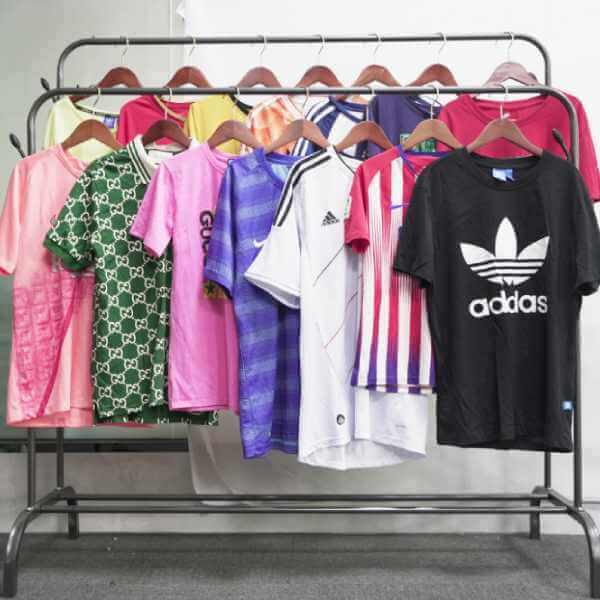
VII. Conclusion: Key Steps and Long-Term Cooperation Advice
In the competitive landscape of wholesale apparel, success depends heavily on the strength of supplier relationships. For B2B buyers seeking branded clothing bales, choosing the right supplier is not just a procurement decision—it is a strategic investment in business sustainability.
The journey begins with recognizing why reliable suppliers matter. Branded clothing bales offer efficiency, resale potential, and strong market appeal, but only when sourced from professional suppliers who value transparency and consistency. Understanding what bales are, how they differ from standard wholesale apparel, and how they fit into a buyer’s business model sets the foundation for smart sourcing.
From there, identifying potential suppliers through independent websites, trade platforms, referrals, and industry events allows buyers to create a pool of options. However, the real challenge lies in evaluation. A trustworthy branded clothing bales supplier demonstrates transparency, clear communication, reliable logistics, and a proven record of professionalism.
Once identified, the next step is building a partnership that extends beyond transactions. Long-term cooperation is cultivated through consistency in orders, mutual respect, and collaborative problem-solving. Buyers who treat suppliers as strategic partners—rather than temporary vendors—gain access to greater flexibility, better terms, and stronger supply chain security.
When selecting suppliers, buyers must keep key considerations in mind: business alignment, scalability, payment security, logistics, flexibility, reputation, and ethical standards. Every decision should be guided by a balance of immediate operational needs and long-term growth objectives.
Ultimately, the path to success in branded clothing bales wholesale lies in diligence, patience, and strategic foresight. Reliable suppliers are not found by chance—they are identified through careful research, verified through structured evaluation, and secured through respectful long-term cooperation.
For B2B buyers, this process is not an optional exercise—it is the cornerstone of building a sustainable and profitable wholesale business. By applying the principles outlined in this guide, you can reduce risks, protect your reputation, and position your company for growth in the competitive global apparel trade.

